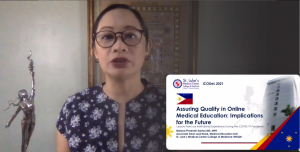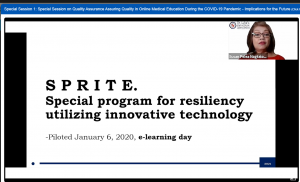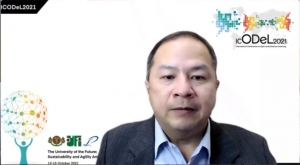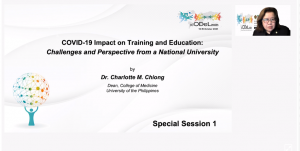The first Special Session of the International Conference on Open and Distance e-Learning (ICODeL) 2021 discussed “How did Philippine medical institutions assure the quality of online medical education during the COVID-19 pandemic?”
The speaker of the session was Dr. Malaya Pimentel-Santos, Associate Dean and Head of the Medical Education Unit of St. Luke’s Medical Center College of Medicine-William H. Quasha Memorial (SLMCCM-WHQM). Dr. Maria Rowena D.R. Raymundo, Assistant Professor and Officer-in-Charge of the Office of the Vice Chancellor for Academic Affairs of the University of the Philippines Open University (UPOU), served as moderator.

Dr. Malaya Pimentel-Santos, Associate Dean and Head of the Medical Education Unit of St. Luke’s Medical Center College of Medicine-William H. Quasha Memorial (SLMCCM-WHQM), was speaker of ICODeL 2021 Special Session 1.
Entitled “Quality Assurance Assuring Quality in Online Medical Education During the COVID-19 Pandemic – Implications for the Future,” the Special Session mainly presented SLMCCM’s experiences, strategies, and challenges in online medical education, and shared similar insights from Reactor-Panelists from other Philippine medical schools.
Dr. Santos described SLMCCM’s transition to online teaching and learning as rapid and forced, since it seemingly was the only option to continue classes and other academic services during the COVID-19 pandemic. Although, the availability of technological structures and systems in the institution aided this transition and implementation.
To give a comprehensive overview of SLMCCM’s experience in continuing education and assuring quality, Dr. Santos presented their strategies and approaches in three points: Zero Lost Learning Days: Initial Pivot to Online Learning, Evaluation of the Newly Implemented Curriculum, and Faculty Development Program Evaluation.
In her first point, Dr. Santos identified SLMCCM’s systematic and outcome-based approach to redesigning instruction and assessment as a critical component to the relative success of their rapid transition to online teaching and learning. SLMCCM’s calibrated and flexible approach with a goal of zero lost learning days enabled them to ensure continuity and mitigate disruptions. Dr. Santos’ second point gave importance to formative, multidimensional, and systematic evaluation of their curriculum to ensure the quality and effectiveness of instruction in the new pedagogical mode. Lastly, Dr. Santos shared results of their faculty development program in her third point wherein she said that the program was deemed effective.
Dr. Santos ended her presentation with a summary of SLMCCM’s strategies in online teaching, learning and assessment. She also shared some of the institution’s technological innovations in complementing online learning.
Three esteemed Reactor-Panelists from renowned medical schools in the country also joined the Special Session.
Dr. Susan P. Nagtalon, Dean of the SLMCCM-WHQM, shared how academic initiative during the pandemic will impact future readiness of medical schools. Particularly, SLMCCM implemented SPRITE, or the Special program for resilience utilizing innovative technology in January 2020. This program, as well as other existing structures in the institution, enabled SLMCCM to swiftly shift into online teaching and learning.

Dr. Susan Nagtalon, Dean of the SLMCCM-WHQM, during the reaction panel of ICODeL 2021 Special Session 1.
Dr. Nagtalon also shared the results of their mixed-methods study on the impact of rapid digitization on the medical faculty, which showed the perceived ease of use and usefulness, and acceptance of medical faculty towards 3 adapted tools of SLMCCM for online teaching and learning. The study emphasized the recurring themes of content, pedagogy, technology, mindset in online teaching and learning. Similar to Dr. Santos’ presentation, Dr. Nagtalon also emphasized the need to familiarize and try out programs and initiatives to know what works in online teaching and learning.
Following Dr. Nagtalon is Dr. Fernandino Jose A. Fontanilla, Dean of the College of Medicine of San Beda University. Dr. Fontanilla highlighted how faculty, structure and systems development are important and should be encouraged for adapting new teaching and learning strategies.

Dr. Fernandino Jose Fontanilla, Dean of the San Beda University College of Medicine, during the reaction panel of ICODeL 2021 Special Session 1.
In San Beda University’s context of implementing online medical education, they considered platform, content, teacher, resources, and student assessment. Dr. Fontanilla highlighted their practice of customizing approaches to online medical education, constantly evaluating the curriculum content and delivery for improvement, and subscribing to platforms and e-resources to complement online teaching and learning. Dr. Fontanilla described the challenges of San Beda University in online medical education in 5 C’s: connectivity, cheating, contact, computer literacy, and care of patient[s].
Lastly, Dr. Charlotte M. Chiong, Dean of the University of the Philippines College of Medicine (UPCM), shared insights on the impact of COVID-19 on training and education, and the challenges and perspective from a national university.

Dr. Charlotte Chiong, Dean of the University of the Philippines College of Medicine, during the reaction panel of ICODeL 2021 Special Session 1.
While different medical schools presented their experiences during this session, what they do have in common are the challenges to online medical education, Dr. Chiong also listed similar challenges already discussed by prior speakers. She discussed UPCM’s strategies in coping with the pandemic for online and limited face-to-face medical education. Dr. Chiong enumerated some of UPCM’s innovations and platform subscriptions in their adaptation to the pedagogical change. Aside from classroom-teaching-and-learning, Dr. Chiong also shared some clinical experiences of UPCM, particularly in the UP Manila-Philippine General Hospital,the biggest modern government tertiary hospital and a COVID-19 referral center in the country.
The ICODeL Special Session 1 was part of the three-day virtual ICODeL 2021 held on 13-15 October 2021. The conference is an event organized by the University of the Philippines Open University (UPOU), along with the Philippine Society for Distance Learning (PSDL), and UPOU Foundation, Inc. (UPOUFI). About 200 attendees from global academic institutions actively participated in the session
Written by the ICODeL 2021 Publicity Committee
Edited by Joane V. Serrano, Anna Cañas-Llamas and Alessa Shainne Hostalero







